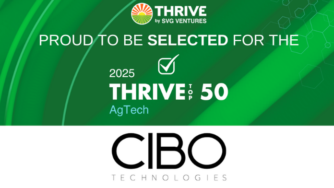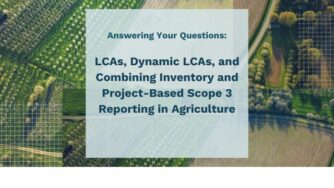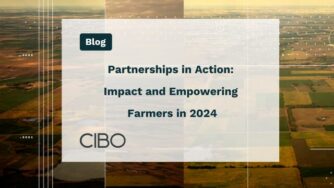2020 presented many unexpected changes and challenges to the world, especially within the agriculture community. On Wednesday, May 12th, Peoples Company hosted a discussion on the most relevant and pressing issues facing agriculture in 2021. The webinar had information and insight from leading experts on farm policy, farm improvements, and carbon markets.
Summary of Presentations
Lead Strategist at Ag Yield Dustin Johnson’s presentation gave a market update and the impact of the South American competition. South American growers have recently done a lot of overselling, which is causing a decrease in sellers from there. Dustin also discussed the current market prices of certain crops. According to him, there have only been a couple of other times in history where the price of corn, wheat, and soy have been as high as they are today. He also went into detail on AgYield inflation and how ethanol has climbed. His forward demand outlook was that the market is projecting good prices, but a lot of supply and demand-driven inflation is not as high as people fear. It is not just about inflation, there is a true supply disruption right now, and that’s why we are experiencing the bull market that we’re experiencing today.
Senior Conservation Advisor David White’s presentation discussed different conservation policies and the extent and value of private lands. Private landowners own 70% of land in the lower 48 states. The quality of our environment depends on the millions of individual decisions that private landowners make every day. Today, we also have to consider the impacts of climate change. Since 1980, 291 weather and climate disasters have exceeded $1 billion. Extreme weather events have become regular occurrences. Nearly 100 million acres of cropland have entirely lost its carbon-rich topsoil due to erosion. The current cost of land degradation reaches $490 billion per year. Today’s fire seasons last 78 days longer than they did in the 1970s and are projected to grow hotter, more unpredictable, and more expensive. The Wildfire Risk Report of 2020 shows nearly 2 million homes in the US are at risk of being destroyed by wildfires. President Biden has made an executive order for all departments to seek solutions to climate change and new bills are being filed regularly. There is also a “30 x 30” executive order to protect 30% of American land by 2030. It calls for an increase in conservation funding but it has yet to specify how much funding. Farm bill funding right now is about $6 billion per year. David’s perspective is that something will pass related to climate or infrastructure and conservation funding will increase but the amount is unknown.
Co-founder and Board Chairman at DIGS Associates Quint Shambaugh’s presentation discussed capital improvement and focused on water off. One category of water off capital improvement is surface drainage, which removes excess water that saturated soils cannot absorb. The financial impacts of capital improvements are increased land value, increased yields and ease of farming, and better for farming and environment. Quint advised people to consider holistic water solutions because water is interconnected and includes your neighbor’s yard as well. Holistic water solutions are the most sustainable and environmentally friendly way to improve your farm. Land owners need to consider what protections they have as well. The assurances include things like access to professionals, proper insurance, contracts, and public utility issues. DIGS Associates is an engineering and consulting company. They take an in-house approach and have an interactive website to use ag software to view your farm data and have a patent-pending web interface.
CIBO’s VP of Marketing Billy Cripe discussed the benefits of carbon credits and carbon markets. Voluntary carbon markets present an excellent opportunity to deliver direct value to growers while promoting long-term economic and environmental sustainability throughout the agricultural value chain. Sustainable farming practices are economically & environmentally aligned and a new approach is needed. The acceleration of the adoption of regenerative practices requires a new process that supports the needs of farmers. Carbon credits are generated by reducing greenhouse gases by avoiding emissions and/or by sequestering carbon dioxide already in the atmosphere. Credits are bought, sold and traded via two types of carbon markets: institutional compliance markets and private voluntary markets. Farm-based carbon credits are derived from reducing GHG and sequestration of carbon due to on-farm activities like cover cropping, reduced or no-till, erosion control measures, precision fertilization, rotational grazing, etc. CIBO uses simulation, modeling & reporting on a carbon footprint under a traditional baseline set of practices. CIBO is on a mission to help individual operations and entire organizations accelerate and scale regenerative agriculture.
CIBO and Peoples Company’s Partnership
CIBO and Peoples Company, the nationally-recognized land transaction and advisory firm, have recently joined forces to offer carbon credits on more than 20,000 acres of managed land. The partnership makes Peoples the first land management company to offer carbon credits. These companies are leading the way in environmentally and economically sustainable incentives for farmers in the U.S. Peoples Company has committed to initially enroll over 20,000 managed acres in the CIBO Impact platform which would create $400,000 of new revenue for land owners and operators within the first year after all credits are verified and sold. Additionally, Peoples Company and CIBO are collaborating to create partial incentive pre-payments for enrolled land. Under the partnership, growers and owners will be eligible to receive immediate incentive payments against expected future sales of carbon credits for the first time. Click here to view our press release.
Meet the Panelists!
- Dustin Johnson is the Lead Strategist at Ag Yield. Dustin has 14 years of experience working with large agricultural producers throughout the Midwest and Delta to mitigate farm price risk. He has been an integral part of designing the AgYield software which helps manage farm margins. AgYield takes the guesswork out of a marketing plan. By using farmers’ actual information AgYield can pinpoint risk areas in order to create, execute, and monitor strategies to mitigate the risk. Our goal is to produce consistent years of solid profits for our clients, while managing risk and revenue.
- David White is a Senior Conservation Advisor. Dave has more than 40 years of professional leadership experience in natural resource conservation with the Natural Resources Conservation Service (NRCS) and in the private sector. Dave worked in numerous locations throughout the United States, culminating his career as Chief of the NRCS from January 2009 to December 2012. At his time as Chief, NRCS’s annual budget exceeded $4 billion, employed almost 11,000 professional staff, and worked out of 2,800 offices across the United States and its territories.
- Quint Shambaugh is the Co-founder and Board Chairman at DIGS Associates. After Graduating from Purdue University, and before co-founding DIGS Associates, Quint founded and built a drainage water management company, while having strong involvement with the 6th generation row crop farm where he was born and raised. Prior to DIGS Associates, Quint developed experience in surface water management, sub-surface drainage systems, earthmoving, RTK based topographic mapping, computer-aided tile design, row crop farming, organic agriculture and a myriad of other services.
- Corey Getz is the Co-founder and CEO at DIGS Associates. Corey’s background has provided him with experience and knowledge in HDPE drainage tile manufacturing, project installation, RTK GPS systems, engineering drainage designs, topographic survey, and much more. He has developed strong relationships with local farmers, landowners, farm managers, governmental agencies, contractors, material and equipment manufacturers, trade associations, and other industry leaders.
- Billy Cripe is the VP of Marketing at CIBO. Billy is currently head of Marketing for CIBO Technologies, an advanced technology platform focused on scaling regenerative agriculture and creating a farmer first carbon marketplace. Billy is a growth marketing executive who focuses on the intersection of technology, data and new markets. He has a background in programming and analytics and has focused the last 20 years on emerging technologies and disruption.



